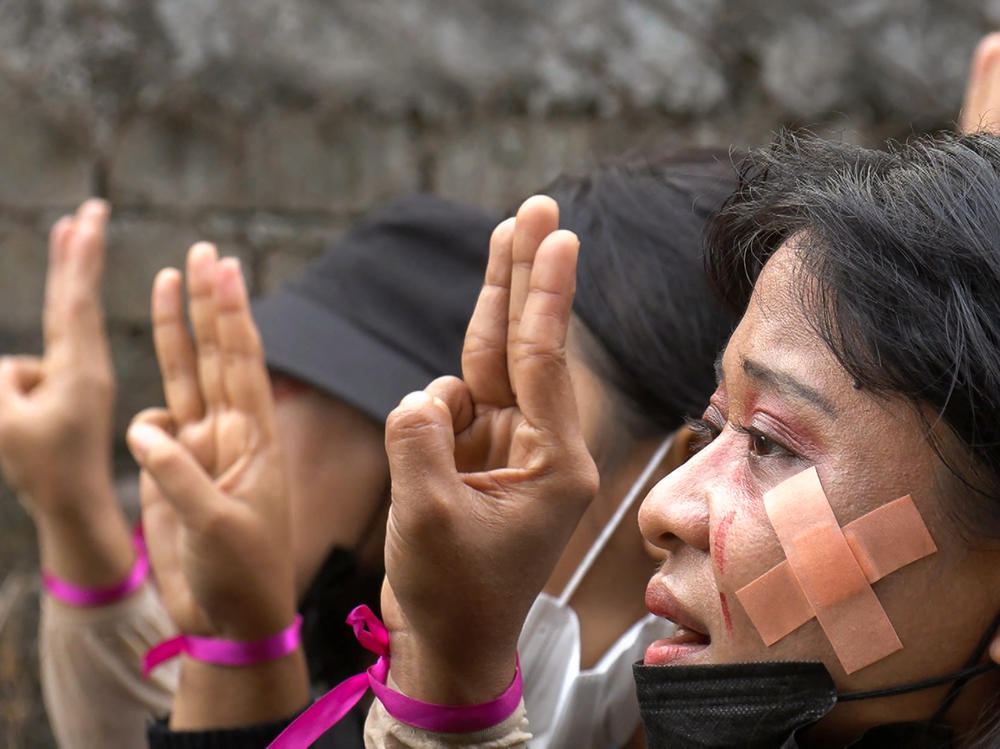Section Branding
Header Content
U.N. Official Warns Of 'Bloodbath' In Myanmar If Coup Isn't Reversed
Primary Content
The United Nations special envoy on Myanmar has issued a stark warning that the country is heading for a likely "bloodbath" if the international community doesn't do more to stop violence against anti-junta protesters.
The remarks by Christine Schraner Burgener during a closed-door session of the U.N. Security Council, come as Myanmar's deposed leader, Aung San Suu Kyi, faced new, more serious charges brought by the junta to mark two months since her Feb. 1 ouster.
Burgener on Wednesday told the Security Council that if "collective action" isn't taken to reverse the coup, "a bloodbath is imminent." She warned of a "multi-dimensional catastrophe in the heart of Asia," according to testimony obtained by The Associated Press and Reuters.
In the weeks since Myanmar's new military rulers seized power, they have faced widespread protests. Increasingly, police have responded with lethal force, using live ammunition against Suu Kyi's supporters.
Peaceful protesters have erected barricades made of tires and bamboo to protect themselves from security forces. Many have taken up the same rebellious three-fingered salute from the Hunger Games films that pro-democracy protesters in neighboring Thailand have adopted.
At least 536 civilians have been killed by security forces in two months of demonstrations, according to the Assistance Association for Political Prisoners (AAPP), an independent group that maintains a tally. Saturday saw 141 deaths at the hands of security forces – the bloodiest single day of protests since the coup, AAPP said. More than 2,700 people have been detained since Feb. 1, it says.
The aid organization Save the Children said in a statement that at least 43 children were among the dead in the past two months, calling the post-coup situation in Myanmar a "nightmare scenario."
"Children have witnessed violence and horror. It is clear that Myanmar is no longer a safe place for children," Save the Children said. "We once again call on the armed forces to end these deadly attacks against protesters immediately."
The strong words came as Myanmar's military in recent days has responded to attacks by both Karen and Kachin ethnic minority militias. The military has launched airstrikes in territory controlled by the Karen National Union, or KNU, causing thousands of people to flee to neighboring Thailand, according to Reuters.
The Karen had fought Myanmar's government until a 2012 truce ended decades of conflict. However, the insurgents appear to be taking advantage of the current chaos to resume their separatist struggle. The KNU is reportedly urging its fighters to prepare to wage a wider conflict against the regime.
In addition, Reuters, quoting Myanmar's DVB news, said at least 20 soldiers were killed and four military trucks destroyed in clashes with the Kachin Independence Army (KIA) on Wednesday.
Also on Wednesday, Myanmar's government announced a unilateral cease-fire against the ethnic insurgents, ostensibly with the goal of fostering negotiations. However, Myanmar Now, an independent news source, quotes a spokesman for the KIA as saying the fighting has continued despite the truce announcement.
Myanmar's military, known as the Tatmadaw, has a history of brutally suppressing ethnic uprisings, including among the Karen and Kachin, but most recently in 2017 against the country's minority Muslim Rohingya. The U.N. has estimated that the military killed at least 10,000 people in the crackdown against Rohingya in Myanmar's northern Rakhine state that followed an attack on the army by a Rohingya militia. Nearly 750,000 others were forced to flee to neighboring Bangladesh.
On Thursday, Suu Kyi, a Nobel Peace Prize laureate, was charged with breaking the country's official secrets law, according to Reuters. She and key members of her National League for Democracy have been detained since the coup on several minor offenses. Thursday's charge against Suu Kyi, however, is much more serious. She stands accused of breaking the country's official secrets law, according to Reuters, which carries a possible sentence of up to 14 years.
Suu Kyi's lead lawyer, Khin Maung Zaw, told Reuters by telephone that three deposed Cabinet ministers and a detained Australian economic adviser, Sean Turnell, were also charged last week under the official secrets law.
Michael Sullivan, reporting from the Thai-Myanmar border, contributed to this report.
Copyright 2021 NPR. To see more, visit https://www.npr.org.

